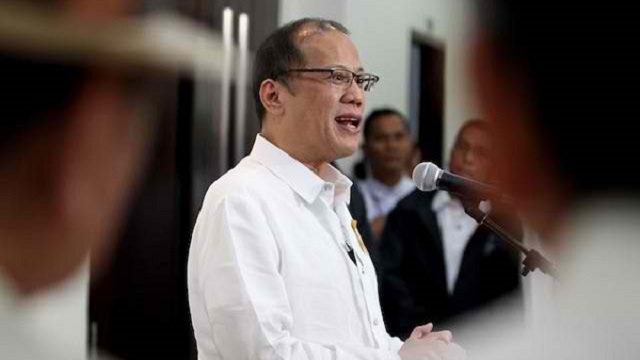SUMMARY
This is AI generated summarization, which may have errors. For context, always refer to the full article.

MANILA, Philippines – Pork Barrel King?
President Benigno Aquino III took offense at the moniker critics have made for him and responded with fighting words, following controversial discussions on government spending.
READ: Palace spending program ‘illegal’
In a speech on Wednesday, October 2 before businessmen, Aquino dismissed issues around the administration’s spending as nothing but a “smear campaign” and an “attempt to muddle the issue.”
“Think about it: I have removed opportunities for corruption; I did this of my own volition, according to my mandate, with no one pressuring me. We are stricter on matters of spending, we stopped the reenactment of the budget, insertions, the misuse of lump sum funds, misuse of the Malampaya Fund, as well as the over-importation of rice,” he said, citing the changes he has done since the administration of his predecessor, former President Gloria Macapagal-Arroyo.
“All the powers at my disposal to gain funds and dole them out where I wanted, I have consistently reduced. Yet despite all this, I have been called the Pork Barrel King.”
Aquino vowed he would not let the criticism halt his government’s reforms, and said he would continue along the straight and narrow path his administration has paved for the country.
“You can be assured: even if I receive daily threats, even if criticism and malicious accusations rain down on me every day, I will never turn my back on the chance to bring about positive change. There are times when I can only shake my head in dismay,” he said.
The President’s speech comes following revelations of massive misuse by lawmakers of the Priority Development Assistance Fund (PDAF) as well as the controversial Disbursement Acceleration Program (DAP) created by the Aquino administration to ramp up spending and help accelerate economic expansion.
DAP is sourced from savings or unreleased General Appropriation Act (GAA) items, as well as realignment and unprogrammed funds.
The Aquino administration has been forced to explain details of DAP after questions were raised over millions of pesos released after the impeachment of former chief justice Renato Corona. Critics tagged the release a bribe or incentive, while a former lawmaker, Sen Joker Arroyo, questioned where the funds given to senators came from.
Aquino has denied the funds released to lawmakers after the impeachment were bribes, saying the releases were made in October 2012. Corona was impeached in May that year.
READ: Jinggoy: P50M for each convict-Corona vote
When the Palace announced that the additional cash releases for projects of lawmakers came from DAP, senators started to raise concerns about its constitutionality and the illegal nature of releasing funds without the approval of Congress.
P1 trillion misused
In highlighting the improvement under his presidency, Aquino slammed the Arroyo administration officials for the various ways they “abused the nation’s coffers” for their benefit, estimating the total amount misused at over one trillion pesos.
He said that through congressional insertions, misuse of the Malampaya Fund, the reenactment of the National Budget and gross overimportation of rice at higher prices alone, “discretionary funds that may have been used to gain political capital and strengthen the patronage system totaled an estimated 836 billion pesos.”
“We have not yet unearthed everything, but already, based on our initial findings, we know that the amount may exceed one trillion pesos,” he said.
Since then, Aquino said he has instituted reforms to ensure government money is used properly and to prevent “horrifying manipulations of the national budget” among them the following:
– Elimination of PDAF
– Passing of budget on time with no reenactment
– Utilization of the Malampaya Fund for energy-related projects
– Automatic earmarking of funds for debt servicing to prevent insertions in the budget
Aquino also used the reforms instituted in the Bureau of Customs (BOC) as a case study of the government’s continuous push to decrease corruption.
“Think about it: An estimated 200 billion pesos was lost from our nation’s coffers because of the transactionalism, patronage, and blatant corruption that have long plagued Customs. It became clear to us: if we only shuffled officials among different positions, and allowed them to remain where they could still do harm, nothing would ever come of our efforts,” he said.
“Our answer: a reset button for an agency that has long been the face of corruption in government.”
Aquino later challenged his critics to impeach him, reiterating his confidence over the way the government has spent national funds.
Growing clamor
Aquino also acknowledged what he described as a growing “call for justice,” after considerable evidence of the pork barrel scam that flourished during the past administration. He thanked the people for their support, and praised the nation for “actively participating and giving their strength to achieve change.”
He said the country is now at a “crossroads,” as it attempts to end corruption and strengthen processes.
“I promise that we will be able to achieve our collective aspirations: not merely fleeting reform, but true transformation that we can leave as a legacy for succeeding generations,” he said.
Aquino emphasized the drive is “not personal,” but that he would pursue his mandate.
“I will do what is right: this is not personal, and to those affected by our efforts who should not be—to the children of the corrupt, who have no stake in this apart from the actions of their parents, or to the others with no fault dragged into this—I offer my apologies; that was not my intention.” – Rappler.com
Add a comment
How does this make you feel?
There are no comments yet. Add your comment to start the conversation.